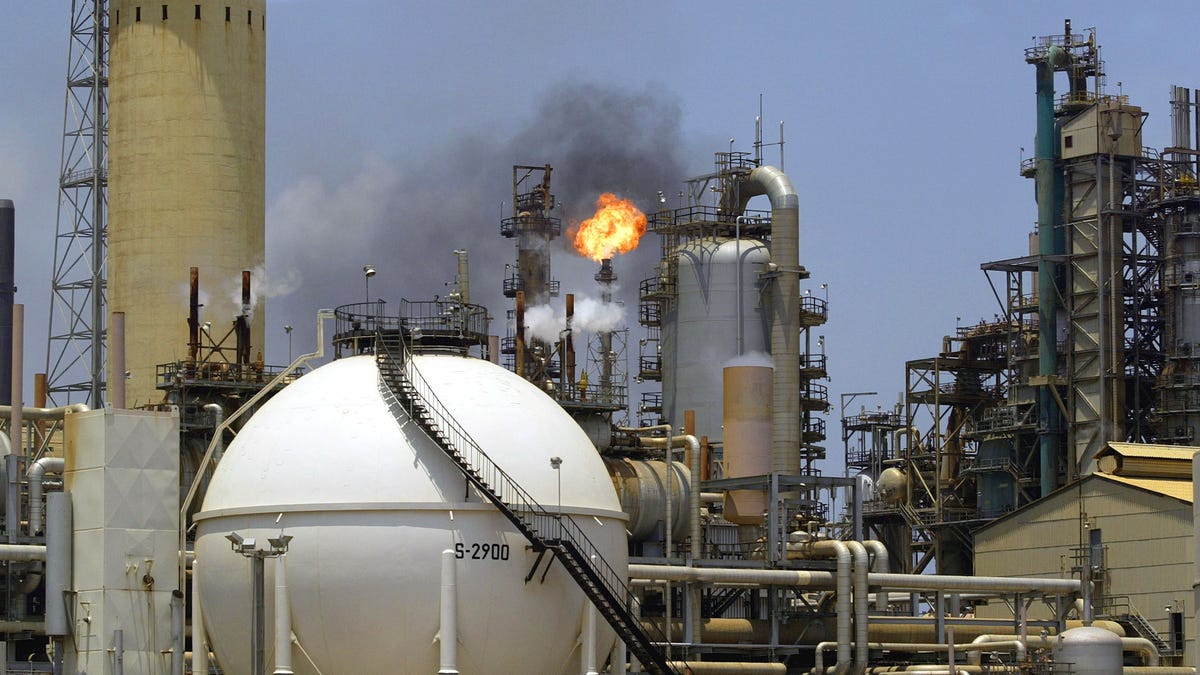
PARAGUANA, VENEZUELA - APRIL 4: A controlled flame burns behind a storage tank in the oil refinery complex of Amuay-Cardon April 4, 2003 in Paraguana, located about 350 miles West of Caracas, Venezuela. Amuay-Cardon, one of the world's largest oil refineries, will export approximately 87,000 barrels of gasoline per day in April, after gasoline exports resumed at the end of a two-month strike by oil workers. (Photo by Kimberly White/Getty Images) (Getty)
CARACAS – The first official indication that the victorious Venezuelan opposition would go after the oil, the country’s most treasured asset, came the day after the pivotal Dec. 6 congressional election.
“[State-owned oil company] Pdvsa, its whole operations, and those oil agreements with Cuba and Petrocaribe, that we should really look into,” said Henrique Marquez, a lawmaker from the oil-rich Zulia state, as results were still coming out.
With roughly 20 percent of global reserves, Venezuela is the world's fifth largest oil exporting country – at one time it exported to U.S. as much as 1.5 million barrels a day, that number now cut by 30 percent.
Oil fueled late President Hugo Chavez’s Bolivarian Revolution since its inception, as it had fueled and sustained the governments over the past 100 years. But with the creation of the Petrocaribe alliance in 2005 oil became a foreign policy centerpiece as well – one that altered the economical balance in the entire region, since it benefits all 17 member countries with unrealistically low oil prices, sold on conditions of preferential payment.
Petrocaribe was described by Chavez as an "energy cooperation scheme" but, as it usually was the case with him, it became much more: a way for Venezuela to exert influence over the Caribbean and Central America, specifically in terms of votes inside the often reluctant Organization of American States (OAS).
Under Petrocaribe, Venezuela agreed to sell member countries oil to the tune of 300,000 barrels a day under such favorable conditions that the opposition says it is actually "gifting."
Broadly speaking, Petrocaribe terms include a two-year grace period with no interest for the oil and fuels received, and 25 years to pay the whole bill at an interest rate of 1 percent.
Some countries, such as Cuba, signed additional agreements under which they are allowed to "pay" with so-called soft money: they send medical doctors, teachers and advisors in exchange for oil. To date, some 200,000 of such Cubans live in Venezuela under this provision.
Now the newly elected majority is threatening to cut the flow of cheap oil – especially given the current oil prices.
Fox News Latino spoke to several members of the upcoming supermajority opposition, all of whom said they wanted the oil agreements reviewed, if not altogether annulled.
“We can’t subsidize Petrocaribe as much as we have been subsidizing it,” said lawmaker Elias Matta, who nonetheless said he is not for stopping oil shipments cold. “That would bring about fatal consequences for those nations, but we do need to be honest about the cost of that oil, those conditions sometimes don’t even cover production costs,” said Matta, who hails from oil-rich Zulia state.
“We cannot sacrifice our population in order to benefit others,” he added. “That agreement needs to be reviewed very carefully.”
According to OPEC figures, Venezuela produces more than 2.6 million barrels of crude oil a day, a third of which is provided by Zulia. Its refinery capacity is nearly 1.9 barrels a day.
Congressman Matta also said that Pdvsa needs to explain why in 2014 it raised its per-barrel costs from $12 to $14/barrel. “They need to answer that, [Pdvsa president] Eulogio del Pino needs to answer that,” he said.
Tomás Guanipa, another lawmaker-elect from Zulia state, said he is dead set against continuing Petrocaribe the way it has been carried out and is inclined to shutting the valve.
“What we need to do is review all of those agreements, we cannot just be gifting the oil, giving it away, when our people in Venezuela is undergoing hardship,” he said in an interview with FNL. “Who has benefited from those agreements? Which are the countries that have benefited from those agreements while we in Venezuela are standing in food lines?” he continued.
As Venezuela’s fortunes have worsened and the oil price steadily dropped (from $100 a barrel just last year to less than $30 now) some say the oil shipments to Cuba should stop at least temporarily, until the country’s economy bounces back from its current 200 percent inflation rate and unprecedented food shortages.
“With the current oil prices, subsidies are not justified,” lawmaker Julio César Montoya said. “Nowadays solidarity must be with the Venezuelan people, who are standing in food lines,” he added.
“Just in terms of oil sales, Chavismo received $1.7 trillion in the last 17 years,” said Richard Blanco, a lawmaker for the capital of Caracas. “No more giving away the resources of the people. That money is needed here, to assuage scarcity, to equip hospitals, to build first-world highways.”
